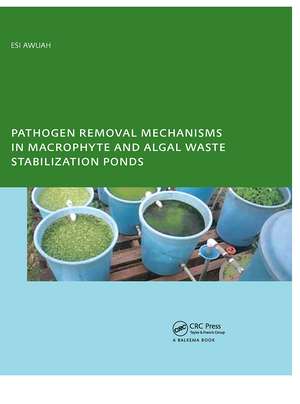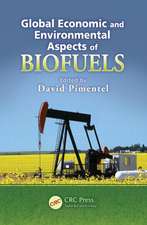Pathogen Removal Mechanisms in Macrophyte and Algal Waste Stabilization Ponds: PhD: UNESCO-IHE Institute, Delft
Autor E. Awuahen Limba Engleză Paperback – 18 ian 2007
| Toate formatele și edițiile | Preț | Express |
|---|---|---|
| Paperback (1) | 327.05 lei 6-8 săpt. | |
| CRC Press – 18 ian 2007 | 327.05 lei 6-8 săpt. | |
| Hardback (1) | 680.73 lei 6-8 săpt. | |
| CRC Press – 9 oct 2017 | 680.73 lei 6-8 săpt. |
Preț: 327.05 lei
Preț vechi: 422.84 lei
-23% Nou
Puncte Express: 491
Preț estimativ în valută:
62.58€ • 65.69$ • 51.94£
62.58€ • 65.69$ • 51.94£
Carte tipărită la comandă
Livrare economică 10-24 aprilie
Preluare comenzi: 021 569.72.76
Specificații
ISBN-13: 9780415416955
ISBN-10: 0415416957
Pagini: 160
Ilustrații: 35 b/w images, 2 color images and 51 tables
Dimensiuni: 210 x 280 mm
Greutate: 0.3 kg
Ediția:1
Editura: CRC Press
Colecția CRC Press
ISBN-10: 0415416957
Pagini: 160
Ilustrații: 35 b/w images, 2 color images and 51 tables
Dimensiuni: 210 x 280 mm
Greutate: 0.3 kg
Ediția:1
Editura: CRC Press
Colecția CRC Press
Public țintă
Postgraduate and ProfessionalCuprins
1. Introduction 2. Environmental Conditions and Enterococci Removal in Macrophyte and Algal-Based Domestic Wastewater Treatment Systems 3. The Effect of pH on Enterococci Removal in Water Lettuce, Duckweed and Algal Ponds 4. Environmental Conditions and Effect of pH on Faecal Coliform Removal in Macrophyte and Algal Ponds 5. Effect of pH Fluctuations on Pathogenic Bacteria Removal in Domestic Wastewater 6. Comparative Performance studies of Macrophyte and Algal Ponds using Low Strength Sewage 7. Comparative Performance Studies of Macrophyte and Algal Ponds Using Medium Strength Sewage 8. The Role of Attachment in the Removal of Faecal Bacteria from Macrophyte and Algal Waste Stabilization 9. Effect of Protozoa on Faecal Bacteria Removal in Macrophyte and Algal Waste Stabilization Ponds Summary in English Summary in Dutch
Notă biografică
Professor Mrs. Esi Awuah obtained her bachelor’s degree at the Kwame Nkrumah University of Science and Technology, Kumasi with a major in Microbiology.
In 1981, she received a WHO award in connection with the Water and Sanitation Decade to do her masters in Environmental Science at the College of Environmental Science and Forestry (SUNY) Syracuse, New York, USA and obtained her Master of Science in 1985.
In 1998, she obtained a fellowship from the Netherlands Government to pursue a PhD degree within the Water and Sanitation Sector Capacity building program in the Department of Civil Engineering, KNUST Kumasi, Ghana at UNESCO-IHE, Delft Netherlands.
She is currently an Associate Professor and the Head of Civil Engineering Department at the Kwame Nkrumah University of Science and Technology, Kumasi, Ghana.
She is also the Head of Department of Environment and Technology at the Institute of Science and Technology for Africa at KNUST, Kumasi and the Environmental Consultant for the Kwame Nkrumah University of Science and Technology, Kumasi, Ghana
Her research areas
She is a member of the following organizations
In 1981, she received a WHO award in connection with the Water and Sanitation Decade to do her masters in Environmental Science at the College of Environmental Science and Forestry (SUNY) Syracuse, New York, USA and obtained her Master of Science in 1985.
In 1998, she obtained a fellowship from the Netherlands Government to pursue a PhD degree within the Water and Sanitation Sector Capacity building program in the Department of Civil Engineering, KNUST Kumasi, Ghana at UNESCO-IHE, Delft Netherlands.
She is currently an Associate Professor and the Head of Civil Engineering Department at the Kwame Nkrumah University of Science and Technology, Kumasi, Ghana.
She is also the Head of Department of Environment and Technology at the Institute of Science and Technology for Africa at KNUST, Kumasi and the Environmental Consultant for the Kwame Nkrumah University of Science and Technology, Kumasi, Ghana
Her research areas
- Environmental quality assessment
- Wastewater treatment/Solid waste management
- Water supply and sanitation
- Ecological city development
She is a member of the following organizations
- Third World Organization of Women in Science (TWOWS)
- Ghana Science Association
- Ghana National Association of University Teachers
Descriere
Waste stabilization ponds are recognized as the solution to domestic wastewater treatment in developing countries. This is because the method is cheap, construction is easy, and no highly-skilled labour is required. In developing countries, the objectives for wastewater treatment require an emphasis on pathogen removal, since most diseases and deaths in these areas are caused by poor sanitation. An understanding of the mechanism involved in pathogen removal will allow improvements in technology, maximizing performance. This study addresses the mechanisms involved in faecal bacteria removal in both macrophyte and algal-based waste stabilization ponds.






